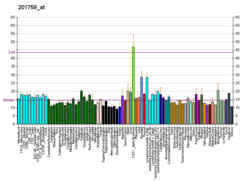TBCD
Tubulin-specific chaperone D is a protein that in humans is encoded by the TBCD gene.[5]
Function
Cofactor D is one of four proteins (cofactors A, D, E, and C) involved in the pathway leading to correctly folded beta-tubulin from folding intermediates. Cofactors A and D are believed to play a role in capturing and stabilizing beta-tubulin intermediates in a quasi-native confirmation. Cofactor E binds to the cofactor D/beta-tubulin complex; interaction with cofactor C then causes the release of beta-tubulin polypeptides that are committed to the native state.[5]
Interactions
TBCD has been shown to interact with ARL2.[6][7]
References
- 1 2 3 ENSG00000141556 GRCh38: Ensembl release 89: ENSG00000278759, ENSG00000141556 - Ensembl, May 2017
- 1 2 3 GRCm38: Ensembl release 89: ENSMUSG00000039230 - Ensembl, May 2017
- ↑ "Human PubMed Reference:".
- ↑ "Mouse PubMed Reference:".
- 1 2 "Entrez Gene: TBCD tubulin folding cofactor D".
- ↑ Shern JF, Sharer JD, Pallas DC, Bartolini F, Cowan NJ, Reed MS, Pohl J, Kahn RA (October 2003). "Cytosolic Arl2 is complexed with cofactor D and protein phosphatase 2A". J. Biol. Chem. 278 (42): 40829–36. PMID 12912990. doi:10.1074/jbc.M308678200.
- ↑ Bhamidipati A, Lewis SA, Cowan NJ (May 2000). "ADP ribosylation factor-like protein 2 (Arl2) regulates the interaction of tubulin-folding cofactor D with native tubulin". J. Cell Biol. 149 (5): 1087–96. PMC 2174823
 . PMID 10831612. doi:10.1083/jcb.149.5.1087.
. PMID 10831612. doi:10.1083/jcb.149.5.1087.
Further reading
- Lewis SA, Tian G, Vainberg IE, Cowan NJ (1996). "Chaperonin-mediated folding of actin and tubulin". J. Cell Biol. 132 (1–2): 1–4. PMC 2120700
 . PMID 8567715. doi:10.1083/jcb.132.1.1.
. PMID 8567715. doi:10.1083/jcb.132.1.1. - Andersson B, Wentland MA, Ricafrente JY, Liu W, Gibbs RA (1996). "A "double adaptor" method for improved shotgun library construction". Anal. Biochem. 236 (1): 107–13. PMID 8619474. doi:10.1006/abio.1996.0138.
- Tian G, Huang Y, Rommelaere H, Vandekerckhove J, Ampe C, Cowan NJ (1996). "Pathway leading to correctly folded beta-tubulin". Cell. 86 (2): 287–96. PMID 8706133. doi:10.1016/S0092-8674(00)80100-2.
- Yu W, Andersson B, Worley KC, Muzny DM, Ding Y, Liu W, Ricafrente JY, Wentland MA, Lennon G, Gibbs RA (1997). "Large-scale concatenation cDNA sequencing". Genome Res. 7 (4): 353–8. PMC 139146
 . PMID 9110174. doi:10.1101/gr.7.4.353.
. PMID 9110174. doi:10.1101/gr.7.4.353. - Tian G, Lewis SA, Feierbach B, Stearns T, Rommelaere H, Ampe C, Cowan NJ (1997). "Tubulin subunits exist in an activated conformational state generated and maintained by protein cofactors". J. Cell Biol. 138 (4): 821–32. PMC 2138046
 . PMID 9265649. doi:10.1083/jcb.138.4.821.
. PMID 9265649. doi:10.1083/jcb.138.4.821. - Nagase T, Ishikawa K, Suyama M, Kikuno R, Hirosawa M, Miyajima N, Tanaka A, Kotani H, Nomura N, Ohara O (1999). "Prediction of the coding sequences of unidentified human genes. XIII. The complete sequences of 100 new cDNA clones from brain which code for large proteins in vitro". DNA Res. 6 (1): 63–70. PMID 10231032. doi:10.1093/dnares/6.1.63.
- Martín L, Fanarraga ML, Aloria K, Zabala JC (2000). "Tubulin folding cofactor D is a microtubule destabilizing protein". FEBS Lett. 470 (1): 93–5. PMID 10722852. doi:10.1016/S0014-5793(00)01293-X.
- Bhamidipati A, Lewis SA, Cowan NJ (2000). "ADP ribosylation factor-like protein 2 (Arl2) regulates the interaction of tubulin-folding cofactor D with native tubulin". J. Cell Biol. 149 (5): 1087–96. PMC 2174823
 . PMID 10831612. doi:10.1083/jcb.149.5.1087.
. PMID 10831612. doi:10.1083/jcb.149.5.1087. - Schubert A, Cattaruzza M, Hecker M, Darmer D, Holtz J, Morawietz H (2001). "Shear stress-dependent regulation of the human beta-tubulin folding cofactor D gene". Circ. Res. 87 (12): 1188–94. PMID 11110777. doi:10.1161/01.res.87.12.1188.
- Wistow G, Bernstein SL, Wyatt MK, Fariss RN, Behal A, Touchman JW, Bouffard G, Smith D, Peterson K (2002). "Expressed sequence tag analysis of human RPE/choroid for the NEIBank Project: over 6000 non-redundant transcripts, novel genes and splice variants". Mol. Vis. 8: 205–20. PMID 12107410.
- Shern JF, Sharer JD, Pallas DC, Bartolini F, Cowan NJ, Reed MS, Pohl J, Kahn RA (2003). "Cytosolic Arl2 is complexed with cofactor D and protein phosphatase 2A". J. Biol. Chem. 278 (42): 40829–36. PMID 12912990. doi:10.1074/jbc.M308678200.
- Colland F, Jacq X, Trouplin V, Mougin C, Groizeleau C, Hamburger A, Meil A, Wojcik J, Legrain P, Gauthier JM (2004). "Functional proteomics mapping of a human signaling pathway". Genome Res. 14 (7): 1324–32. PMC 442148
 . PMID 15231748. doi:10.1101/gr.2334104.
. PMID 15231748. doi:10.1101/gr.2334104. - Rual JF, Venkatesan K, Hao T, Hirozane-Kishikawa T, Dricot A, Li N, Berriz GF, Gibbons FD, Dreze M, Ayivi-Guedehoussou N, Klitgord N, Simon C, Boxem M, Milstein S, Rosenberg J, Goldberg DS, Zhang LV, Wong SL, Franklin G, Li S, Albala JS, Lim J, Fraughton C, Llamosas E, Cevik S, Bex C, Lamesch P, Sikorski RS, Vandenhaute J, Zoghbi HY, Smolyar A, Bosak S, Sequerra R, Doucette-Stamm L, Cusick ME, Hill DE, Roth FP, Vidal M (2005). "Towards a proteome-scale map of the human protein-protein interaction network". Nature. 437 (7062): 1173–8. PMID 16189514. doi:10.1038/nature04209.
This article is issued from
Wikipedia.
The text is licensed under Creative Commons - Attribution - Sharealike.
Additional terms may apply for the media files.




